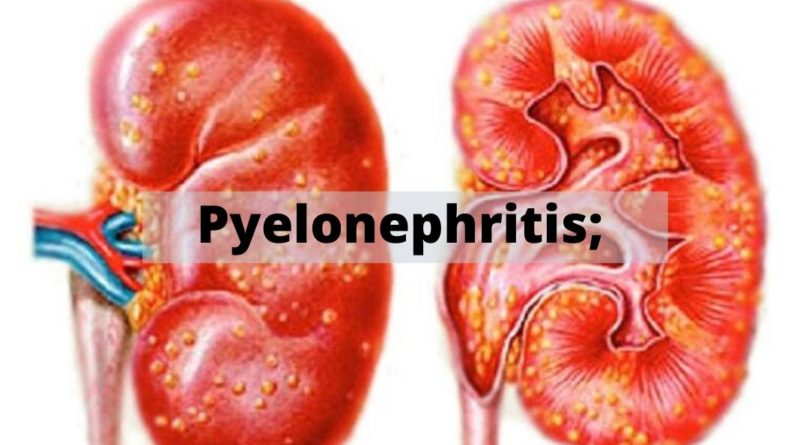Pyelonephritis: Symptoms and Causes
The kidneys play a crucial role in separating waste and fluids from your body. However, some factors make people more susceptible to urinary tract infections. About 1 in 30 urinary tract infections can progress to kidney infection or pyelonephritis, which can severely affect the organs and have a negative impact on the quality of life.
Table of Contents
What is pyelonephritis?
Pyelonephritis or kidney infection is a urinary infection that affects one or both kidneys. You can get a kidney infection when Escherichia coli (E. coli) enters the urethra, passes through your urinary tract, increases in number, and travels to the kidneys.
What are the causes of this kidney infection?
Some factors can increase the risk of contracting this infection.
To be a woman
Pyelonephritis symptoms develop more often in women because their urethra is shorter and closer to the vagina and anus. As a result, bacteria easily enter the body and move to the urinary tract and kidneys.
Urinary tract blockage
Kidney stones, an enlarged prostate in humans, slow down all urine flow and weaken its ability to completely empty the bladder. This ultimately leads to infection of the kidneys.
The use of the urinary catheter
The bacteria responsible for pyelonephritis can pass through the catheter and infect the kidneys.
Immune system problems
HIV / AIDS, type 2 diabetes, or medications to prevent organ transplant rejection can cause problems with the immune system. As a result, the risk of infection increases.
Reflux vesicoureteral
It is a condition characterized by small amounts of urine that rise from the bladder to the ureters and kidneys. Affected individuals are more likely to have a kidney infection during childhood and adulthood.
Common symptoms of pyelonephritis
There are several signs of kidney infection that need to be monitored.
- Fever
- Shaking chills
- Pain in the back, side (flank), abdomen, lower abdomen, or groin
- Nausea and vomiting
- Stomach ache
- Urinary disorder or hematuria.
- Diarrhea
- The burning sensation or pain when urinating.
- Increased urge to urinate.
- Lack of appetite
- Weakness or fatigue
- High fever
What is the difference between kidney infection and urinary tract infection (UTI)?
Although kidney infection and urinary tract infections have similar symptoms, they are not the same. If you have been diagnosed with a kidney infection, you have a urinary tract infection. But if you have a urinary tract infection, that doesn’t necessarily mean you have pyelonephritis.
Urinary infection can be classified into three categories: pyelonephritis, cystitis (infection of the bladder), or urethritis (infection of the urethra). Pyelonephritis is a urinary tract infection that is considered more serious because it goes back to the kidneys and ureters.
Pyelonephritis in children
Here are several causes associated with kidney infections in children:
- Dehydration
- Urine retention for long periods
- Lack of hygiene of the genitals.
- The chemicals contained in bubble baths.
- Wear tight underwear or pants
- Cleaning the genitals from back to front.
However, some children may not show obvious signs of kidney infection. Some children with this disease can only have a high temperature. Additional tests may be helpful in detecting the presence of this infection.
How to treat a kidney infection?
Most doctors recommend antibiotics like ciprofloxacin or trimethoprim to treat kidney infections. However, these medications have side effects such as diarrhea, malaise, nausea, and headaches.
Non-steroidal anti-inflammatory drugs like ibuprofen should also not be taken as kidney infections. Several studies have linked these drugs to kidney failure and acute kidney damage.
Natural treatments
You can try the following natural remedies to treat pyelonephritis
Apple cider vinegar: Although little research indicates that apple cider vinegar may be necessary for this infection. This can be so helpful for urinary tract infection. In fact, this vinegar is known to fight the bacteria responsible for the infection.
Thermal pads: In case the infection causes back or abdominal pain, put thermal pads on the affected area to relieve them.
High-quality filtered water: Drinking high-quality filtered water can help you kill bacteria that cause infections.
Raw Vegetable Juice: A juice made from organically grown vegetables like carrots, cucumbers, celery, and spinach helps to alkalinize the blood. Improves defense against urinary tract infections and possibly kidney infections.
Essential oils
You can also use the following essential oils to treat kidney infections or urinary tract infections:
- Cedarwood
- eucalyptus
- Clove
- The coriander
- Celery seed
- Myrrh
- Thyme linalool.
Consult your doctor and perform a skin test before using essential oils. This helps prevent allergic reactions or other side effects. You can dilute the oil of your choice in a carrier oil like coconut, sweet almond or jojoba. As a result, your skin is smoother. In addition to all of these remedies, rest well and try to wait at least 2 weeks before returning to work.
sources:
National Institute of Diabetes and Digestive and Kidney Diseases, January 2014
National Kidney Foundation, August 9, 2016
Urology Care Foundation, What is kidney infection – pyelonephritis?
WebMD, February 7, 2017
Centers for Disease Control and Prevention, “Frequently Asked Questions” about catheter-associated urinary tract infection
NHS, January 4, 2018
Mayo Clinic, August 17, 2017
Mayo Clinic, August 25, 2017




